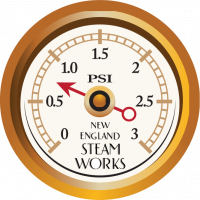Any tips on removing plugs on CI rads?
Comments
-
I found this thread from last winter to be quite helpful.New England SteamWorks
Service, Installation, & Restoration of Steam Heating Systems
newenglandsteamworks.com0 -
Thank you both! Dad's old tools include large smooth jaw wrench (not sure what type) and I've seen the "divide and conquer" cut & chisel technique described, but not as well as you just did.
I sincerely appreciate the help!0 -
-
-
-
Harbor Freight has a 48" pipe wench for ...less than you might expect. I'm sure it's not as nice as a Ridgid pipe wench, but it might be worth a try, especially for a one-off.0
-
-
A penetrating oil that is more effective than PB Blaster or anything commercially available is a 50/50 mix of Acetone and automatic transmission fluid. Application of this mixture along with a few solid taps on the square head of the plug will work wonders.Dennis Pataki. Former Service Manager and Heating Pump Product Manager for Nash Engineering Company. Phone: 1-888 853 9963
Website: www.nashjenningspumps.com
The first step in solving any problem is TO IDENTIFY THE PROBLEM.1 -
I would assume you are changing to hot water heat??? Probably not 2 pipe steam.
In either case are your CI rads connected across the top as they are on the bottom??
Post pictures if not sure what I speak of.0 -
You don't need a pipe wrench for a plug, just a socket wrench of the right size and a flex handle or breaker bar, and if you lay the radiator on it's side it won't tip over.Hatterasguy said:
Some don't have a 4' pipe wrench. And those that do, might not have the helper and would be wearing the radiator on their own feet.Stephen Minnich said:And as far as being the fastest way, this is as fast as it can possibly get. Put a wrench on it and turn.
Just another DIYer | King of Prussia, PA
1983(?) Peerless G-561-W-S | 3" drop header, CG400-1090, VXT-240 -
Stephen Minnich said:
We just did exactly that on a ton of radiators at an old church. Plugs and bushings, all 100 years old.
Spray on some PB Blaster, tap the fitting to help it soak in, let it soak for a while, put a 4' pipe wrench on it.
100% successful for us.
Nothing's going to penetrate the threads if they were sealed with pipe joint compound.Pumpguy said:A penetrating oil that is more effective than PB Blaster or anything commercially available is a 50/50 mix of Acetone and automatic transmission fluid. Application of this mixture along with a few solid taps on the square head of the plug will work wonders.
Just another DIYer | King of Prussia, PA
1983(?) Peerless G-561-W-S | 3" drop header, CG400-1090, VXT-240 -
@Hap_Hazzard - If you're right and I'm wrong, I'll continue doing it my way because it works every time.
Easily.
Without thread damage or the radiator breaking.Steve Minnich0 -
I don't doubt it works. I just think it works just as well without that stinky PB Blaster. The stuff that's really doing the work is the elbow grease.Just another DIYer | King of Prussia, PA
1983(?) Peerless G-561-W-S | 3" drop header, CG400-1090, VXT-240 -
-
No success yet on any fronts. Steam system was cobbed up over years, is not balanced, house addition just tapped on, etc. I was hoping to convert to HW and tap on return pipe. Quotes to redo steam piping were well over $6K not counting demolition of plaster walls and we have at least one clear leak of some kind in between 2nd floor and ceiling. Can not get one plug to turn. Tried cutting one off and splitting the remaining ring into sections, then chisel = no luck.0
-
I can't seem to find anyone in Westchester-area NY who would work on these either plug removal or refinishing, so am moving toward abandoning any hopes of retaining the CI radiators and just trying to find someone who could reuse them. Any thoughts welcome. Call me "Depressed in WP".0
-
Nice, classic American Radiator, probably from 1920's, no pipe dope on plugs - they seem to never have been removed, just painted over. 5 tube, various lengths, all one-pipe steam now.

0 -
I think you would be better off to tune up-balance your system.
Post some pictures of the boiler and its piping.
Many of us started with problem systems, and gradually have worked through the sticky points.
Tell us the settings on the pressuretrol, and make a list of the main air vents, and be certain that the 2nd floor leak is not coming from above the floor.--NBC1 -
I don't think you are ready for the suicide watch list yet.TmKady said:No success yet on any fronts. Steam system was cobbed up over years, is not balanced, house addition just tapped on, etc. I was hoping to convert to HW and tap on return pipe. Quotes to redo steam piping were well over $6K not counting demolition of plaster walls and we have at least one clear leak of some kind in between 2nd floor and ceiling. Can not get one plug to turn. Tried cutting one off and splitting the remaining ring into sections, then chisel = no luck.
1st, the plug will come out with the cut and chisel method. The only question is wether you damage the female threads/ cut into the valley in the process.
2nd, it's a fair assumption that the original steam piping is good, so no need to get into plaster and lath. Probably just the addition where things went wrong. No plaster or lath there.
Sometimes going to water makes sense. Usually not. Stay with us, give us more info and pics.
New England SteamWorks
Service, Installation, & Restoration of Steam Heating Systems
newenglandsteamworks.com0 -
Yeah, those plugs aren't going to be easy. You might just want to drill and tap them for a smaller pipe. HW uses smaller pipe anyway.
But I'm curious about the leak you mentioned. You said it was between the 2nd floor and the ceiling? Is there a third floor? If not, I don't know what might be above the 2nd floor risers that would leak on a one-pipe steam system.Just another DIYer | King of Prussia, PA
1983(?) Peerless G-561-W-S | 3" drop header, CG400-1090, VXT-240 -
Leaks were within the first floor ceiling and second floor subfloor floor where pipes ran horizontally, in some cases across the room about 8 feet (no good vertical where they wanted the radiator to land. I am giving the cut and chisel a deeper cut to see if I can get the plug removed on the largest radiator where I already started with that approach. Maybe too afraid to cut female threads.
You all have been very kind to offer this advice and I appreciate it!0 -
Set of radiators similar to picture above available to a good home (not scrap yard! In White Plains, NY. today is Sat Oct 15. Just email me: green.energydr@gmail.com.
Last note: my Mom decided she wanted baseboard and new slimmer radiators in a few spots, I had little success getting old ones ready to convert to two pipe, but someone with drill and tap metalworking skills certainly could. I really don't want these to be scrapped, so if you can use them, please email me right away! They will need to leave very soon. Thank you.0 -
How many and what sizes?
I could probably use a couple, but I have no idea how I'd get them here (King of Prussia, PA).Just another DIYer | King of Prussia, PA
1983(?) Peerless G-561-W-S | 3" drop header, CG400-1090, VXT-240 -
Why hasn't anyone suggested a blue wrench? I used a MAP torch to change out the bushings on a few of my radiators, of the same style. After a minute or two of heat, a 3' wrench pulled them out with "relative" ease. No cutting and no damage other than needing some paint touch-up.0
Categories
- All Categories
- 87.3K THE MAIN WALL
- 3.2K A-C, Heat Pumps & Refrigeration
- 61 Biomass
- 429 Carbon Monoxide Awareness
- 120 Chimneys & Flues
- 2.1K Domestic Hot Water
- 5.8K Gas Heating
- 115 Geothermal
- 166 Indoor-Air Quality
- 3.7K Oil Heating
- 77 Pipe Deterioration
- 1K Plumbing
- 6.5K Radiant Heating
- 395 Solar
- 15.7K Strictly Steam
- 3.4K Thermostats and Controls
- 56 Water Quality
- 51 Industry Classes
- 50 Job Opportunities
- 18 Recall Announcements






